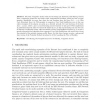Free Online Productivity Tools
i2Speak
i2Symbol
i2OCR
iTex2Img
iWeb2Print
iWeb2Shot
i2Type
iPdf2Split
iPdf2Merge
i2Bopomofo
i2Arabic
i2Style
i2Image
i2PDF
iLatex2Rtf
Sci2ools
183
click to vote
WINE
2010
Springer
2010
Springer
The Complexity of Equilibria in Cost Sharing Games
We study Congestion Games with non-increasing cost functions (Cost Sharing Games) from a complexity perspective and resolve their computational hardness, which has been an open question. Specifically we prove that when the cost functions have the form f(x) = cr/x (Fair Cost Allocation) then it is PLS-complete to compute a Pure Nash Equilibrium even in the case where strategies of the players are paths on a directed network. For cost functions of the form f(x) = cr(x)/x, where cr(x) is a non-decreasing concave function we also prove PLS-completeness in undirected networks. Thus we extend the results of [7, 1] to the non-increasing case. For the case of Matroid Cost Sharing Games, where tractability of Pure Nash Equilibria is known by [1] we give a greedy polynomial time algorithm that computes a Pure Nash Equilibrium with social cost at most the potential of the optimal strategy profile. Hence, for this class of games we give a polynomial time version of the Potential Method introduced ...
Related Content
| Added | 15 Feb 2011 |
| Updated | 15 Feb 2011 |
| Type | Journal |
| Year | 2010 |
| Where | WINE |
| Authors | Vasilis Syrgkanis |
Comments (0)

